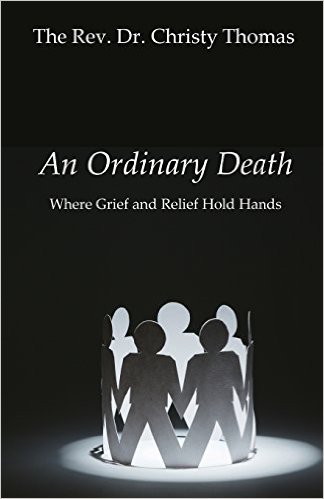I am now back to the questions I asked at the very beginning of this crisis: How does one go about dying in our society? Why can’t we embrace an ordinary death fearlessly?
Note: this is an excerpt from An Ordinary Death: Where Grief and Relief Hold Hands, available from Amazon.com.

I’ve always had leftover socks. When all my sons were young, just matching socks was a huge weekly chore and I always kept a bag of mismatched ones which I would periodically pull out and try to make pairs from them. Eventually, the unpaired ones would be cut up and used for cleaning rags. Yes, lost socks.
Several months ago, I was driving on LBJ freeway in Dallas and saw the middle cushion to a sofa resting on the side of the freeway. Just the middle cushion. I immediately visualized some woman looking with disbelief at her husband/boyfriend who had transported their new sofa, “You what? You lost the cushion on the way home? Don’t you realize I will NEVER be able to match the fabric on this couch and now it is ruined?” A lost cushion.
Periodically, I lose my debit card. I’m always just stuffing it in a pocket after using it, and than have a frantic search for it later. Earlier this summer, the frantic search turned up nothing. Had to get a new one. I’m betting the lost card will appear someday, useless and dead.
I had a thriving cherry tomato plant in my garden, all ready to put out an abundance of blooms as soon as the weather cools, ensuring me a good supply of those sweet tiny tomatoes. But in my necessary neglect of the garden recently, some of those gorgeous butterflies that have graced us for some time now did what butterflies do: laid eggs, which hatched into voracious caterpillars. Within days, that huge plant was stripped. That tomato plant is now lost.
Why do we fight the ordinary death process?
And now I’m losing my mother. Her stroke was 15 to 16 days ago. Actually, strokes, for there were several. This independent, brilliant woman initially gave us hope of recovery.
But my own hope is fading. She seems to me to be declining mentally more each day, and while some movement has returned to her left arm, she is unable to do even the most basics of self-care tasks. She can’t call for a nurse if she needs it.
She can’t feed herself, toilet herself, bathe herself, dress herself, or express herself with more than just a few words, often impossible to hear.
She can no longer read–and she was an extraordinary well-read woman. She did try to write yesterday a bit–she seems to think we are making a movie about rehab, but I couldn’t make out more. Fascinating way to integrate what is going on with her.
I am now back to the questions I asked at the very beginning of this crisis: How does one go about dying in our society? Why can’t we embrace this natural act fearlessly?
I think about the neurologist in the hospital and realize that I never heard from her a full picture of the damage to my mother’s brain. I never asked to see the results of the scan; I never asked to have them explained to me; and this was also never offered to me. All I heard was, “multiple stokes, both sides of the brain, but right side mostly gone.”
I also know that brains can heal, but in an 88 year old women who has lived a sedentary life, who has had untreated high blood pressure for years, who is clearly worn out now and was very much wearing out before this happened?
Her skin is beginning to break down, she has completely lost her cough reflex, so can’t clear her lungs, has no feeling in her left hand, and goodness only knows what else. So we have her in a $1000/day facility where the cost is currently being covered by Medicare and for what?
I’ve expressed this before and will say it again. I love my mother. She gave life and gave it generously. Full of hospitable graciousness, long suffering with my father, intellectually curious, sociable and gregarious, kind to all and especially to her grandchildren, fiscally careful and wise–all these phrases describe her.
Now, I ask this: am I loving her well at this point? I know this is not the way I want to be treated when I get to this point. I want to be taken home, gently nursed, generously medicated to ensure I have no pain, and left to drift off.
But there is always the “what if . . .” What if I am premature? I do not want to hurry the process. But I also do not want to unnecessarily delay it if the delay causes any distress for her.
We really don’t know how to die, do we?












